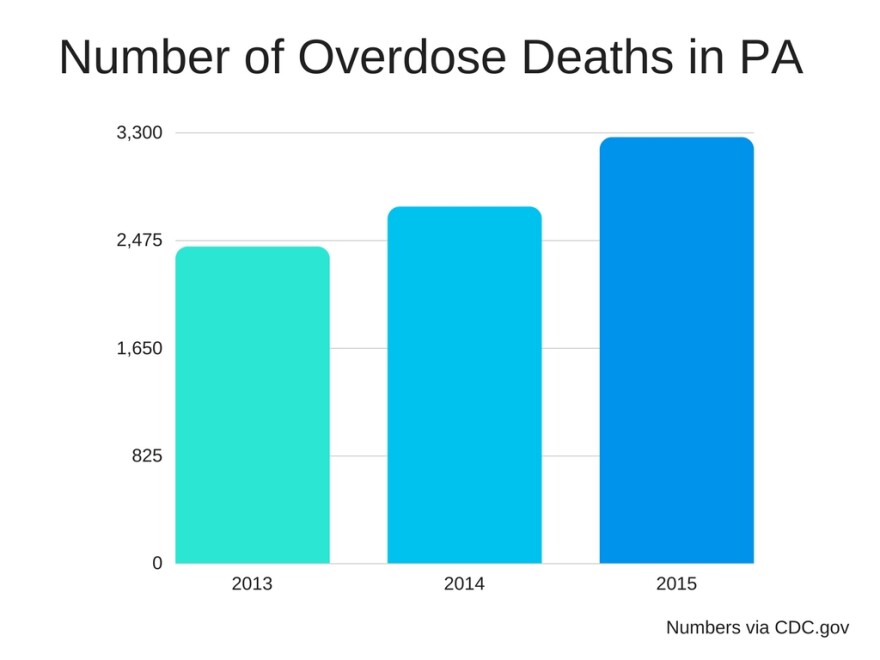At the age of 13, Alex Hoffman was already using alcohol and marijuana. By 14, he was on juvenile probation.
“I wouldn’t stop smoking weed, I wouldn’t stop drinking, so I kept failing drug tests and that lead to my first time going involuntarily into juvenile rehab,” Hoffman said.
It was not his last involuntary commitment. He bounced in and out of programs and jail for years before getting clean three years ago, at the age of 21. He remembered being dropped off at a juvenile facility by his parents on his 16th birthday.


“A lot of frustration, a lot of tears, a lot of anger,” Hoffman said. “I was tearing the family apart.”
And when he turned 18, it became even more frustrating for Hoffman’s parents because they no longer had any legal control over him.
State Sen. Jay Costa, D-Forest Hills said after hearing from constituents with similar stories, he introduced legislation that he hopes will help. Senate Bill 391 would create a procedure through which a person could have a family member involuntarily committed to drug or alcohol treatment.
“Essentially what our legislation does is it provides hope to families that have expressed their helplessness,” Costa said. “They really have no means or mechanism to get them the treatment that they believe that person needs.”
The process would begin with a family member filing a petition, followed by a court date, an examination by a doctor who would draw up a treatment plan and then a judge’s ruling that the addicted user must follow the plan.
Though, some critics worry about the bill’s impact.
“Frankly it raises a red flag for us,” said Andy Hoover, spokesperson for the ACLU of Pennsylvania. “It is a form of detention … so, if a government wants to do that, the bar for doing that is really high.”

There is a process for getting someone committed to a mental health facility if they are a danger to themselves or others, but drug addiction is not covered by the code.
The ACLU is also concerned about some of the vagaries when it comes to the lack of definitions for addiction, imminent danger and the length of confinement.
“Effectively, someone could be in in-patient treatment indefinitely and if someone does not follow that order, it’s considered contempt of court and that can lead to fines and even jail time,” Hoover said.
Costa countered and said that judges, county administrators and doctors would be involved at every step.
Peter Luongo, executive director of the Institute for Research, Education and Training in Addictions, said he wonders who will be doing the evaluations.
“Is it a physician that is a specialist in addiction medicine?” he asked. “Are they going to use the standard placement criteria?”
The law simply requires that, “The physician must be authorized to practice medicine and surgery or osteopathic medicine and surgery” in the state.

Luongo praised Costa’s efforts, but said SB 391 might not be the solution. Costa said he hopes the bill can be a starting point for more conversations around addiction treatment.
“We’re past the point now where I think we can dismiss it out of hand because of some of the concerns that have been raised,” Costa said. “It’s a crisis, it’s in epidemic proportions here in Pennsylvania and we should talk about it.”
It’s a common maxim in the addiction and treatment community that unless the user is ready to quit, no amount of treatment will help.
“It was just a huge game to me at first,” Hoffman said of his involuntary treatment when he was younger.
He said, looking back, he feels bad for the way he acted in those facilities.
“Doing that affects other people that really want to stay clean,” he said. “I never knew who I harmed who was actually there seriously trying to get off drugs.”
Joshua McClure, an interventionist at Cranberry Psychological Center, said failure rates are high for people who don’t want to get clean are forced into treatment. However, he said encouragement from family, especially by sharing emotions other than anger, can help.
“The loved one sees the pain that’s going on and they’re not going to get defensive or angry with their loved ones whenever they’re crying and telling them that they love them,” he said. “It helps them break though some of that denial.”

McClure said he also worries that it might be hard to find doctors who are willing to go into court and accept the liability of making a diagnosis and outlining treatment.
Additionally, Loungo and McClure said they’re not sure how many treatment beds in southwestern Pennsylvania are available that could accommodate a patient who does not want to stay. At the same time, the proposed law would also require that the person seeking an involuntarily commitment put up a bond to prove they can pay for treatment.
Loungo and McClure said that stipulation could create a law that would only help the wealthy
“Whenever somebody is court ordered, some insurance companies will not pay for treatment,” McClure said.
Officials with UPMC and Highmark said the insurance companies would cover the treatment at in-network facilities as if it were a voluntary commitment.
“We would (cover) treatment initiated under an involuntary commitment for substance use services, unless that law or associated regulations would direct others to pay,” said Dr. James Schuster, chief medical officer of behavioral and Medicaid services for the UPMC Insurance Services Division.
The measure has been assigned to the judiciary committee, where Costa said there will be public hearings on the bill.
“We have to have a conversation about this,” he said. “And that’s what this is designed to do.”
No hearing dates have yet been set.




